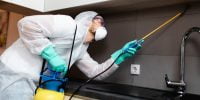Last Updated on March 18, 2024 by Kelvin Nielsen
In Florida, dealing with mold in a rental property can be challenging. As a tenant, you’re entitled to a habitable living environment. Florida law requires landlords to maintain rental properties in a condition fit for living.
This includes addressing mold issues that can affect health and safety.

If you’ve discovered mold in your home, it’s crucial to notify your landlord promptly. Written communication is best for keeping a record. Your landlord is responsible for addressing the problem. Failing to do so may provide you with options like withholding rent under certain conditions.
However, rent withholding is a legal matter with specific requirements. Before making any decisions, you should understand your rights and responsibilities. Procedures on how to stop or delay an eviction in Florida are equally important, should the situation escalate.
Understanding Tenant and Landlord Rights and Responsibilities
When dealing with mold in rental properties, it’s essential to understand the distinct rights and responsibilities appointed to both tenants and landlords under Florida law.
Legal Grounds for Withholding Rent in Florida
Under Florida Law, you have the right to withhold rent if your landlord fails to maintain the rental property, which includes remedying mold issues that can affect your health and safety.
To legally withhold rent, you must comply with specific procedures, including providing proper notice to your landlord as outlined in the Florida Landlord-Tenant Act.
The Implied Warranty of Habitability
This warranty is a legal doctrine. It requires landlords to provide and maintain livable conditions in their rental properties. Issues like significant mold growth breach this warranty and may give you, the tenant, grounds to withhold rent.
You should document all communication with your landlord about habitability issues.
Mold Specific Laws and Regulations
Regarding mold, Florida’s Health and Safety Code does not clearly define landlord liability for mold remediation. However, landlords are generally required to address any condition that jeopardizes their tenant’s health.
If your rental has mold, reporting it to your landlord promptly may ensure that it’s addressed in a timely fashion, maintaining your security deposits and living conditions according to agreement terms.
Steps to Take if You Encounter Mold in Your Rental Unit
If you find mold in your rental unit, you need to take certain steps promptly.
Proper Notification and Documentation
First, notify your landlord in writing. A written notice should include the date and the mold’s location. Take photos as evidence of the mold problem and keep copies of all correspondence. This creates a documented record that you can use in court if necessary.
Withholding Rent, and Repair and Deduct Policy
Before you withhold rent, review your lease agreement. Some agreements allow rent withholding if the landlord fails to address health hazards. You may repair the mold damage and deduct costs from your rent. However, you must first notify your landlord and give them a chance to make repairs themselves.
Seeking Legal Assistance and Possible Resolutions
Consulting a mold attorney can provide clarity on your situation. They may offer a free consultation to discuss your options. These could include terminating the lease or seeking professional mold remediation. Should your health suffer from the mold, legal recourse may be necessary.
Frequently Asked Questions

In Florida, tenants have rights concerning mold in their rental units. The following are the frequently asked questions regarding the topic.
What rights do I have as a tenant in Florida when dealing with mold issues?
You have the right to a habitable living environment. If mold compromises this, you can request repairs. You might be eligible even for rent reduction if unresolved.
Under what circumstances is a tenant permitted to break a lease due to mold problems in Florida?
You may break a lease if the mold makes your home uninhabitable. This is valid when the landlord neglects to remedy the situation promptly.
What is the maximum amount of time a landlord in Florida has to address and remediate mold in a rental property?
Landlords should act within 7 days of notification. This varies by lease agreement. If they don’t, you may take further action.
Is a tenant in Florida able to pursue legal action against a landlord for mold-related health issues?
Yes, if you can prove the landlord’s negligence caused your health issues. You must show that the landlord knew about the mold and ignored it.
Does the presence of mold in a rental unit constitute a violation of health codes in Florida?
Mold can violate health codes if it endangers tenant health. Your local health department assesses and confirms code violations.
What are the conditions under which a tenant may be relocated due to mold infestation in their Florida rental unit?
Relocation is possible if the mold makes your unit unlivable. Landlords may need to find you comparable housing during remediation.
Sources: FL Statutes Chapter 83 Part II, Warranty of Habitability in Florida
Disclosure: The content herein isn’t a substitute for advice from a professional attorney. It’s only meant to serve educational purposes. If you have a specific question, kindly seek expert attorney services.

Hi, I’m Kelvin Nielsen, an experienced landlord and accomplished real estate lawyer. My focus is on answering your questions about renting in the hopes of making your life as a renter or a landlord a bit easier.







